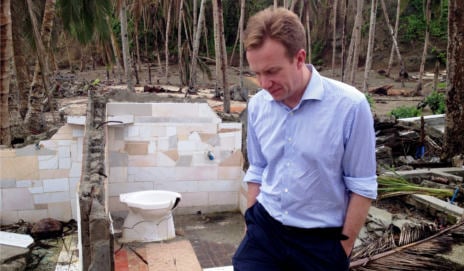NORWAY
Philippine president asks Norway to revive talks
The president of The Philippines on Thursday called on Norway to help revive failed peace talks with the country's Maoist guerrillas, a senior presidential aide has told AFP.
Published: 9 January 2014 21:40 CET

Foreign Minister Børge Brende visting typhoon-stricken areas in the Philippines on Wednesday - Photo: Astrid Sehl / Ministry / NTB Scanpix
President Benigno Aquino met Norwegian Foreign Minister Børge Brende in the Philippine capital after Brende said Norway remained committed to mediating negotiations between Manila and the National Democratic Front.
"While serious problems have confronted and continue to challenge this particular peace process, the president affirmed the government's commitment to pursue a peaceful settlement of all internal armed conflict," Teresita Deles, Aquino's principal adviser on the talks, said after the meeting.
The Maoist insurgency has claimed 30,000 lives since 1969 according to government estimates, though its armed force is down to about 4,000 guerrillas from more than 26,000 in the late 1980s.
"The government of the Philippines will continue to consult with Norway as to how the process may move forward in light of current difficulties," said Deles.
In April last year the Aquino government announced that the peace talks being brokered by Norway had collapsed, dampening hopes of a political settlement before the president's six-year term ends in mid-2016.
Speaking to reporters earlier Thursday, Brende urged the Philippine government and Maoist rebels to consider returning to the negotiating table in the coming months.
"We are looking at the opportunities to resume talks in the future… during the (Aquino) presidency," Brende said after meeting with Philippine Foreign Secretary Albert del Rosario.
On Sunday Luis Jalandoni, the Netherlands-based chief rebel negotiator, said in a statement to news organisations that the Maoists held the Aquino government "responsible for stopping the peace process".
He accused the Philippine government of failing to honour agreements between the negotiators, including the release of detained communist rebels.
"Because of the Aquino government's refusal to comply… the prospects this year of the peace negotiations between the Aquino administration and the (rebels) are dim," he said.
The Aquino government has had better results in negotiations with Muslim rebels, who have waged a guerrilla war for secession in the mainly Catholic nation's south in an insurgency which has claimed 150,000 lives since the early 1970s.
Manila says it is on track to sign a peace treaty with the Muslim rebels before Aquino leaves office.
Url copied to clipboard!


 Please whitelist us to continue reading.
Please whitelist us to continue reading.
Member comments